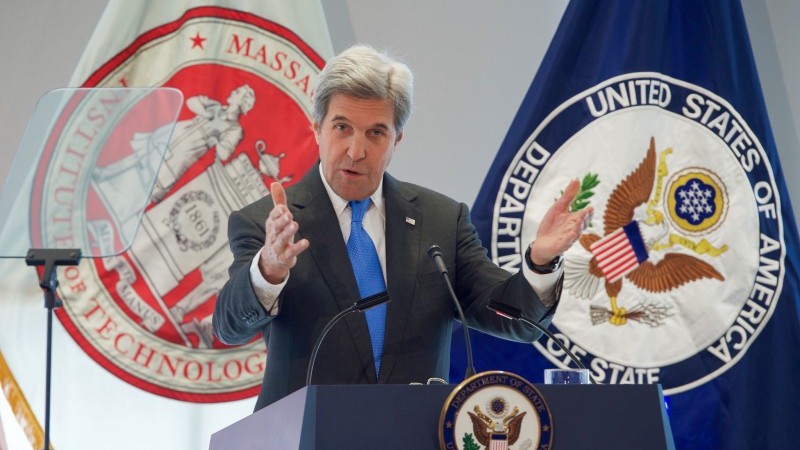John Kerry has attacked “powerful forces” that have resisted action on climate change as he prepares to step down as US secretary of state, with his likely successor to be ExxonMobil boss Rex Tillerson.
“Powerful forces, invested in the status quo are working against change. But the fact is that change has already started. We need to find ways to speed it up dramatically,” said Kerry.
“Now this really shouldn’t be a tough call. But as I said, we face resistance of a strange combination of doubters and people making a lot of money off today’s paradigm. That’s what it’s all about.”
Kerry was speaking to an audience at the Massachusetts Institute of Technology on Monday morning, just 11 days before the inauguration of Donald Trump.
Tillerson is the new president’s pick to replace Kerry. His foreign policy experience amounts to expanding Exxon’s global oil business.
There's nothing partisan about climate change for the world's scientists – Sec. of State John Kerry at MIT
— Zahra Hirji (@Zhirji28) January 9, 2017
Tillerson’s company is the subject of a slew of investigations by state attorneys general into whether it intentionally mislead investors regarding the danger of climate change.
Exxon has long contributed to lobby groups, such as the American Legislative Exchange Council (Alec), that have attempted to disrupt attempts to fight climate change and run misinformation campaigns that questioned climate science. Many oil companies have now disowned Alec. Exxon remains a donor.
Kerry said that obfuscators were on the wrong side of the argument from a moral and economic perspective.
“If we refuse to get sidetracked by those who cannot see beyond the outmoded and downright dangerous energy sources of the past and if we respond boldly to the urgency of this moment then we will unlock the enormous potential of this opportunity,” said Kerry.
Weekly briefing: Sign up for your essential climate politics update
While Tillerson has made public statements accepting the findings of climate science, Trump and many of his other cabinet picks have questioned the threat it poses and promised to revive the US’ flagging coal industry (an outcome president Barack Obama said was impossible in an article for the journal Science on Monday).
But Kerry called on policymakers to truly factor in the costs associated with burning fossil fuels – from health impacts of pollution, to the clean-up costs of disasters. Those costs, he said “in the case of dirty fuels are enough to at least double or triple the more obvious upfront expense”.
.@JohnKerry: Whether we are able to meet this moment is as big a test of courage & vision as you’ll find.#ActOnClimate #KerryAtMIT pic.twitter.com/oomLYp0Vmo
— Department of State (@StateDept) January 9, 2017
“When you do the real cost accounting… coal is neither cheap nor sensible. When you do the real accounting you’ll immediately see that in the long term carbon intensive energy is one of the costliest and most foolhardy investments that you could possibly make… These are real costs. And anyone who burns coal, needs to burn into their brain these calculations,” said Kerry.
Kerry’s speech contained similar themes and inconsistencies to one he made just day’s after the election to diplomats in Marrakech at the annual UN climate conference.
“Because of the clear trends that we are observing. Today I am confident that the United States is going to meet all of the emissions targets that we have set, not because of future government action, but because of the market-based forces that are taking hold all over the world,” said Kerry.
Does this beg the question why the government didn't set higher targets, if it will meet them in the absence of action? https://t.co/jHpRBV0cGD
— Sophie Yeo (@some_yeo) January 9, 2017
It was people at institutions like MIT, who would shape the future more than any others, said Kerry. He cited bygone alumni, such as internet inventor Tim Berners Lee, lauded his audience and implored them to reshape the world through ideas.
But Kerry, trapped between optimism and blind hope, tempered this bullish assessment with a plea to Trump to adhere to the responsibility of the presidency.
“I’m not going to speculate on the policies that our president elect and his secretary of state will choose to pursue. But I will tell you this, in the time I’ve spent in public life, one of the things I’ve learned is that some issues look a lot different when you’re actually in office compared to when you’re on the campaign trail. The truth is that climate change, shouldn’t be a partisan issue,” he said.
“It astounds me that people continue to resist this. But even if we accept that action is necessary success is not going to come without sustained commitment… And it certainly won’t happen without leadership. All across every sector of the economy and all levels of government.”
